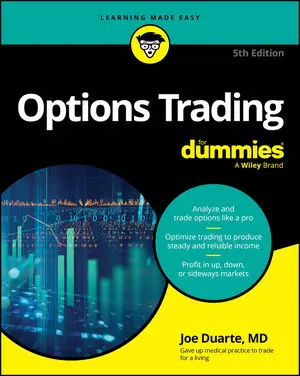This builtin is not currently supported: Animation
- Book & Article Categories

- Collections

- Custom Solutions
 Main Menu
Main MenuBook & Article Categories
 Main Menu
Main MenuBook & Article Categories
Joe Duarte
Dr. Joe Duarte is a financial writer, private investor and trader, and former money manager/president of River Willow Capital Management. In addition to Options Trading For Dummies, he is the author of Trading Futures For Dummies and Market Timing For Dummies. Visit his website at joeduarteinthemoneyoptions.com
Articles & Books From Joe Duarte
An easy-to-read and authoritative collection of strategies, tools, and resources for new and experienced options traders In the newly revised fifth edition of Options Trading For Dummies, experienced finance writer, investor, and money manager, Joe Duarte, walks you through practical and actionable strategies for traders seeking to boost their income while keeping risk in check.
Article / Updated 08-31-2023
No matter which analyst’s report you’re reading, you must remember that the analyst’s primary income is coming either from the brokerage house or the large institutional clients that he or she serves. Analysts rate stocks on whether you should consider purchasing them, but no standardized rating system exists.
Article / Updated 05-26-2022
Many trend‐following trading systems use a moving average for their starting points. In this trend‐following example, the system is designed for position trading, which means you use a relatively long moving average. Short selling isn’t permitted with this simple system.The first step is to define buy and sell rules for your initial testing.
Cheat Sheet / Updated 08-30-2021
Trading options is a bit different from trading stocks, but they both require research and study. If you’re going to trade options, make sure you know what the different order types are, how to read changes in the market with charts, how to recognize how stock changes affect indexes and options, and how indexes are built.
Article / Updated 07-01-2021
A financial option is a contractual agreement between two parties. Although some option contracts are over the counter, meaning they are between two parties without going through an exchange, standardized contracts known as listed options trade on exchanges. Option contracts give the owner rights and the seller obligations.
Cheat Sheet / Updated 06-30-2021
Trading options is a bit different from trading stocks, but they both require research and study. If you're going to trade options, it's important that you know order types, how to read changes in the market with charts, how to recognize how stock changes affect indexes and options, and how indexes are built.Trading order typesA variety of order types are available to you when trading stocks; some guarantee execution, others guarantee price.
Article / Updated 06-30-2021
A variety of order types are available to you when trading stocks; some guarantee execution, others guarantee price. This brief list describes popular types of trading orders and some of the trading terminology you need to know.
Market order: A market order is one that guarantees execution at the current market for the order given its priority in the trading queue (a.
Article / Updated 06-30-2021
A call option provides you with profits similar to long stock, whereas a put option provides you with profits similar to short stock. This makes sense given your rights as an option holder, which allow you to buy or sell stock at a set level. There is one slight difference between stock rewards and option rewards: Options require an initial premium payment that you must consider when identifying potential gains.
Article / Updated 10-26-2017
Trading in options and futures is risky business, and regulations governing those trades are stringent, even with regard to allowing you to open an account. Before opening an account for you, a broker must provide you with a disclosure document that describes the risks involved in trading futures and options contracts.
Article / Updated 10-26-2017
Trend following is favored by many technicians for one simple reason: Trends offer excellent trading opportunities for profit. Unfortunately, the popularity of the trend‐following approach is one of its greatest weaknesses. Too many of these systems generate very similar buy and sell signals, which, in turn, makes outperforming the average trader difficult for any individual trend‐following trader.




